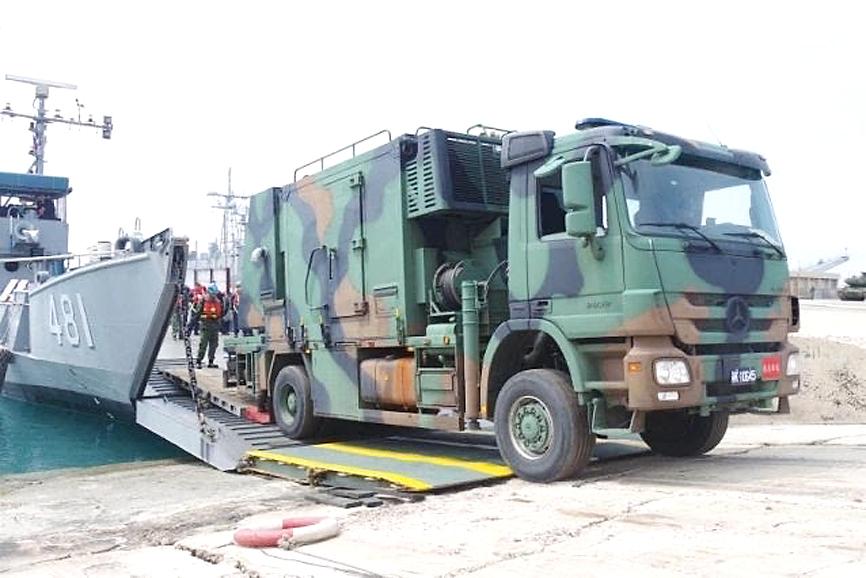The Ministry of National Defense yesterday denied that there were mass dismissals after reportedly classified images of a top-secret radar system were leaked to the military’s own Youth Daily News.
The online article published on March 26 — which has since been taken down — reported on the Navy 151st Amphibious Fleet’s mission to resupply Magong City (馬公) in Penghu County, and was purportedly written by a political warfare officer serving on the tank landing ship ROCNS Chung Ho.
While the article itself did not contain sensitive information, highly classified aspects of a mobile anti-stealth passive radar system designed by the Chungshan Institute of Science and Technology were visible in two images used for the report.

Screen grab from the Youth Daily News Web site
First deployed in 2018, the radar system is reportedly capable of detecting the Chinese People’s Liberation Army’s (PLA) much-vaunted J-20 stealth fighter.
The images were republished on Monday last week by the English-language military aviation Web site Alert5 in an article titled “Taiwan Has Deployed Anti-Stealth Passive Radar System in Penghu.”
The Chinese-language Apple Daily reported that the ministry was unaware of the breach until US officials contacted Taipei via national security channels, while the Liberty Times (sister paper of the Taipei Times) said that some of the officials were with the American Institute in Taiwan.
The misstep angered Minister of National Defense Chiu Kuo-cheng (邱國正), the Apple Daily added.
Yesterday, Chiu had disciplinary investigations opened on as many as 100 officers of the Naval Fleet Command and the Political Warfare Bureau, which runs the Youth Daily News, the Apple Daily said, citing an anonymous source reported to be a general officer at the ministry.
More than 20 officers could receive reprimands or other disciplinary actions over the secrecy breach, it quoted the source as saying.
“An earthquake is coming to the ministry,” the source added.
“Operational security is a basic component of a soldier’s duty and the command has consistently demanded that each soldier be intimately familiar with operational security procedures and thoroughly implement them,” the Navy Command said in a statement.
An image of a mobile passive bistatic radar system was displayed at the 2013 Taipei Aerospace and Defense Technology Exhibition.
The display text provided by the institute said that the vehicle’s beamforming capabilities could act in combination with active radar or sources to detect aerial targets.
The long-distance system’s receivers use a different angle than active radar to detect a target and the absence of radar emissions helps it to evade countermeasures, the text said.

Intelligence agents have recorded 510,000 instances of “controversial information” being spread online by the Chinese Communist Party (CCP) so far this year, the National Security Bureau (NSB) said in a report yesterday, as it warned of artificial intelligence (AI) being employed to generate destabilizing misinformation. The bureau submitted a written report to the Legislative Yuan in preparation for National Security Bureau Director-General Tsai Ming-yen’s (蔡明彥) appearance before the Foreign Affairs and National Defense Committee today. The CCP has been using cognitive warfare to divide Taiwanese society by commenting on controversial issues such as Taiwan Semiconductor Manufacturing Co’s (TSMC, 台積電) investments in the

HELPING HAND: The steering committee of the National Stabilization Fund is expected to hold a meeting to discuss how and when to utilize the fund to help buffer the sell-off The TAIEX plunged 2,065.87 points, or 9.7 percent, to close at 19,232.35 yesterday, the highest single-day percentage loss on record, as investors braced for US President Donald Trump’s tariffs after an extended holiday weekend. Amid the pessimistic atmosphere, 945 listed companies led by large-cap stocks — including Taiwan Semiconductor Manufacturing Co (TSMC, 台積電), Hon Hai Precision Industry Co (鴻海精密) and Largan Precision Co (大立光) — fell by the daily maximum of 10 percent at the close, Taiwan Stock Exchange data showed. The number of listed companies ending limit-down set a new record, the exchange said. The TAIEX plunged by daily maxiumu in just

INVESTIGATION: The case is the latest instance of a DPP figure being implicated in an espionage network accused of allegedly leaking information to Chinese intelligence Democratic Progressive Party (DPP) member Ho Jen-chieh (何仁傑) was detained and held incommunicado yesterday on suspicion of spying for China during his tenure as assistant to then-minister of foreign affairs Joseph Wu (吳釗燮). The Taipei District Prosecutors’ Office said Ho was implicated during its investigation into alleged spying activities by former Presidential Office consultant Wu Shang-yu (吳尚雨). Prosecutors said there is reason to believe Ho breached the National Security Act (國家安全法) by leaking classified Ministry of Foreign Affairs information to Chinese intelligence. Following interrogation, prosecutors petitioned the Taipei District Court to detain Ho, citing concerns over potential collusion or tampering of evidence. The

‘COMPREHENSIVE PLAN’: Lin Chia-lung said that the government was ready to talk about a variety of issues, including investment in and purchases from the US The National Stabilization Fund (NSF) yesterday announced that it would step in to staunch stock market losses for the ninth time in the nation’s history. An NSF board meeting, originally scheduled for Monday next week, was moved to yesterday after stocks plummeted in the wake of US President Donald Trump’s announcement of 32 percent tariffs on Taiwan on Wednesday last week. Board members voted to support the stock market with the NT$500 billion (US$15.15 billion) fund, with injections of funds to begin as soon as today. The NSF in 2000 injected NT$120 billion to stabilize stocks, the most ever. The lowest amount it